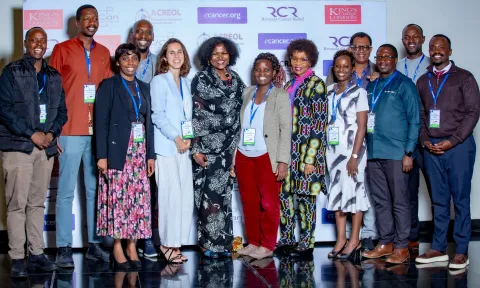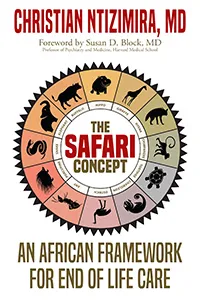UICC Young Leader and Technical Fellow Dr Christian Ntizimira champions palliative care in Rwanda
Dr Christian Ntizimira, Founder and Executive Director of ACREOL in Rwanda, shares his experience improving the understanding and delivery of palliative care, supported by his UICC Technical Fellowship at the Princess Margaret Cancer Centre in Toronto, Canada.

Dr Ntizimira with partners and collaborators of ACREOL during a Choosing Wisely conference.
HIGHLIGHTS
- UICC Young Leader and Technical Fellow, Dr Christian Ntizimira, speaks of his experience in expanding palliative care in Rwanda, following the government's post-genocide pushes for inclusivity and healthcare improvement in the country.
- Through Dr Ntizimira's efforts, over 1,500 healthcare providers have been educated in cancer prevention and palliative care, demonstrating significant progress in patient quality of life and the pivotal role of strong political will and healthcare dedication in resource-limited settings.
- Embracing an 'adopt and adapt' approach to implementing health policies, Dr Ntizimira introduces The Safari Concept, advocating for a culturally sensitive model of palliative care to promote greater acceptance of medical practices and reduce care disparities.
UICC Young Leader Dr Christian Ntizimira, Founder and Executive Director of the African Center for Research on End of Life Care (ACREOL), has been at the forefront of developing palliative care for fifteen years.
His journey into medicine was shaped by the aftermath of the genocide against the Tutsi in 1994, when the government looked at all aspects of society in rebuilding the country, with a strong emphasis on inclusivity and addressing invulnerabilities.
“It’s not only one million people who died in 100 days, but I think humanity itself seemed lost,” Dr Ntizimira explains. “The leadership was starting from scratch and focused not just on security and the economy and infrastructure but all aspects. There was a willingness to consider new initiatives and approaches that enhanced the quality of life of patients and their families. Cultural resilience and the government's commitment to healthcare facilitated the integration of palliative care into our health system.”
Dr Ntizimira's interest in medicine was also sparked by witnessing the unnecessary suffering caused by the genocide. “I thought that medical school would be the best place to somehow contribute to rebuilding the country,” he says.
Initially aspiring to be a surgeon, his career trajectory shifted dramatically after a profound encounter with a young patient dying in pain without medication and with the patient's mother, who knelt before him asking for help.
“I was really shocked. Culturally, as a Rwandan, an older adult should not be kneeling before a younger person, especially not to ask me to do what I am supposed to do – and could not. Like many physicians, I feared to prescribe morphine at that time due to the myths surrounding it, the fears that if you prescribe it, the patient will die and you will go to prison," Dr Ntizimira explains. “And in any case its availability was severely limited. I wondered, does it make sense to be a surgeon if such vulnerable people do not get any support?”
This was in 2009 and the government was organising the first palliative care training, which Dr Ntizimira attended. He then completed a fellowship in palliative care at Harvard Medical School in 2011, as Rwanda was launching the first African national policy on palliative care to improve the quality of life of patients, particularly those at advanced stages of HIV/AIDS.
This policy was later integrated into the national cancer control plan and the non-communicable diseases (NCD) strategic plan, with a focus on the accessibility and availability of morphine.
When Dr Ntizimira began his advocacy, there was a widespread lack of awareness and understanding among healthcare professionals and the general population about the need for palliative care.
“Palliative care was generally understood exclusively as end-of-life care, only for the dying. People called me ‘the gravedigger’, considering the people I was caring for as already condemned. I told them, ‘the gravedigger sees patients five minutes after they die, I see them before’. But, of course, there are two essential aspects of palliative care. Terminal patients in any case deserve our attention and a better quality of life as they die; and it is supportive care for people who we expect to survive but are going through treatment and in pain.”
Dr Ntizimira’s UICC Technical Fellowship in 2023 at the Princess Margaret Cancer Centre in Toronto, Canada, further provided him with a global perspective on palliative care, introducing him to the latest practices and reinforcing the importance of a holistic approach to patient care.
"The Technical Fellowship was a transformative experience, not only expanding my knowledge of palliative care but also reinforcing the critical need for palliative care in oncology and integration into our country’s healthcare services."
Dr Ntizimira's work, supported by the Rwandan government and international partners, has led to the training of over 1,500 healthcare providers in cancer prevention and palliative care. "Now morphine is more readily available and prescribed, and the quality of life of patients is considerably better," he says, demonstrating the potential for progress in low-resource settings with strong political support and dedicated healthcare professionals.
The UICC Technical Fellowship also introduced him to the field of psycho-oncology, under the leadership of Gary Rodin, who pioneered the field in Canada. Psycho-oncology focuses on understanding and treating the psychological, emotional and behavioural challenges faced by people with cancer, in addition to managing the disease.
“Traumas have different sources – anxiety resulting from conflict or a car accident is not the same as trauma resulting from a cancer diagnosis. They must be approached differently,” Dr Ntizimira explains. “Psycho-oncology must be made part of the treatment and to remove the stigma around cancer so that the patient and his or her family are encouraged to pursue treatment.”

Dr Ntzimira continues to be at the forefront of progress in palliative care, not only in Rwanda but more widely in Africa and even beyond, with an ‘adopt and adapt’ approach to care that he presents in his recent book: The Safari Concept: An African Framework for End-of-Life Care.
This innovative approach to palliative care is deeply rooted in the nuances of local cultures and societal structures. The notion of ‘adopt and adapt’ emphasises the critical importance of first embracing the local perceptions of care before tailoring medical practices to address the unique challenges faced by communities. Ntizimira's insights derive from his rich experiences across continents, particularly noting the stark contrasts in patient autonomy and family involvement between Western settings and Africa.
“Effective communication needs to transcend simple language barriers. In the African context, adopting metaphors and animal archetypes to speak about cancer and simplify complex medical discussions fosters a level of understanding and connection that was previously difficult to attain,” he says.
By moving beyond a one-size-fits-all approach, Dr Ntizimira advocates for a more compassionate, culturally sensitive model of care that honours both the individual and their community. His model not only enhances patient and family engagement but also enriches the practice of medicine by integrating traditional support systems with modern medical practices.
The success of Dr Ntizimira's approach has not only transformed palliative care in Rwanda but has also resonated internationally, with healthcare professionals worldwide finding parallels and applications within their own diverse cultural settings.
Looking ahead, Dr Ntizimira advocates for the integration of palliative services into public health systems, alongside the implementation of cost-effective strategies and robust leadership. This approach is aimed at significantly reducing disparities in care between urban and rural areas, thereby ensuring equal access to essential services and negating the need for patients to travel long distances.
“By focusing on integration and leadership, and using what the country has at hand, we can significantly advance care without waiting for external aid. Meaningful change does not always require substantial funding or resources. It can begin with simple yet profound improvements in communication between healthcare providers, patients and families.”
Last update
Thursday 21 March 2024
